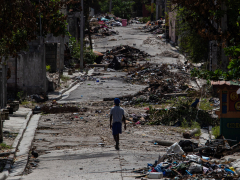International mission would surge personnel in Haiti, with mandate to ‘neutralise, isolate, and deter’ gangs.
The United Nations Security Council has voted to expand an international security force deployed to Haiti and transform it into a so-called “Gang Suppression Force”.
The resolution passed by the council on Tuesday provides a clear mandate for the force to work with local authorities to “neutralise, isolate, and deter” gangs, secure infrastructure, and seek to secure institutional stability. It would raise the personnel ceiling from 2,500 in the current mission, first approved in 2023, to 5,550 personnel.
Recommended Stories
list of 3 items
- list 1 of 3“Don’t see any solution” soon for Haiti violence
- list 2 of 3At least 4 dead, 20 missing after boat sinks off Dominican Republic
- list 3 of 3US to deport Haitian legal permanent residents with alleged gang ties
end of list
The resolution also requests that the UN secretary-general establish a UN Support Office in Haiti to provide increased logistical support amid the Caribbean nation’s overlapping security, humanitarian and political crises.
“The result today allows us to have the necessary reconfiguration on the ground in order to face the gangs and, therefore, address the insecurity situation in the country,” Panama’s Representative to the UN Eloy Alfaro De Alba said following the vote.
“Today, we say to Haiti that, once and for all, you are not alone,” Alfaro De Alba said.
Panama and the United States first introduced the latest resolution in August. It passed on Tuesday with 12 votes in favour and none against. Permanent Security Council members China and Russia, along with rotating member Pakistan, abstained from the vote.
Following the vote, Russian envoy Vassily Nebenzia said “the tools of international assistance to Haiti” previously approved by the Security Council had “failed to produce any sustainable results”.
He criticised the resolution for having a “virtually unrestricted mandate to use force against anyone and everyone labelled with the vague term ‘gangs’”, while further calling the plan “ill-conceived and rushed”.
Haiti has a controversial history when it comes to foreign intervention, particularly in light of rampant sexual abuses committed by peacekeepers deployed in the wake of Haiti’s 2010 earthquake. The forces were also responsible for a cholera outbreak that killed about 10,000 people.
But speaking last week, during the United Nations General Assembly General Debate, Laurent Saint-Cyr, the current chairman of the Transitional Presidential Council of Haiti, v





